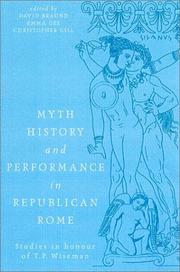| Listing 1 - 10 of 158 | << page >> |
Sort by
|
Book
ISBN: 3515130977 3515130950 9783515130950 3868351957 Year: 2021 Publisher: Stuttgart : Franz Steiner Verlag,
Abstract | Keywords | Export | Availability | Bookmark
 Loading...
Loading...Choose an application
- Reference Manager
- EndNote
- RefWorks (Direct export to RefWorks)
Die Korrespondenz des Politikers und Philosophen M. Tullius Cicero (106–43 v. Chr.) ist ein einzigartiges Quellenkorpus: von keiner anderen Person der römischen Antike sind vergleichbar umfassende Selbstzeugnisse überliefert. In Ciceros Selbstdarstellung zeigt sich der Habitus einer Senatsaristokratie, deren soziales Feld durch das Netzwerk der Freundschaftsbeziehungen strukturiert ist. Die gesellschaftlichen Praktiken situieren sich in urbanen und ländlichen Räumen zwischen Italien und den Provinzen, die als Orte von Begegnung und Kommunikation unter Eliteangehörigen, aber auch zwischen diesen und sozial Untergeordneten dienen. Die Autorinnen und Autoren setzen in ihren Analysen der Cicero-Briefe aktuelle theoretische und methodologische Ansätze der historischen Anthropologie um und entwickeln neue Perspektiven auf die römische Sozialgeschichte. Mikrohistorische Lektüren lassen die geschlechtsspezifischen Bedingungen des Handelns erkennen, die Bedeutung von Krankheit und Tod und das Verhältnis zu griechischen Sklavinnen und Sklaven. In der Auseinandersetzung mit den deutsch- und französischsprachigen Forschungstraditionen römischer Sozialgeschichte entwerfen die Beiträge ein multiperspektivisches Bild des gesellschaftlichen Alltags im 1. Jahrhundert v. Chr.
Histoire sociale --- Cicéron --- Correspondance.
Book
ISBN: 9783110337075 311033707X 3110337657 3110371162 Year: 2014 Publisher: Berlin ; Boston : De Gruyter.
Abstract | Keywords | Export | Availability | Bookmark
 Loading...
Loading...Choose an application
- Reference Manager
- EndNote
- RefWorks (Direct export to RefWorks)
Stoïcisme --- Aristotélisme --- Cicéron (0106-0043 av. J.-C.). --- Cicéron --- Et la philosophie grecque. --- Stoïcisme --- Aristotélisme --- Cicéron
Book
ISBN: 9783515103022 3515103023 Year: 2013 Volume: 42 Publisher: Stuttgart : F. Steiner,
Abstract | Keywords | Export | Availability | Bookmark
 Loading...
Loading...Choose an application
- Reference Manager
- EndNote
- RefWorks (Direct export to RefWorks)
State, The --- Religion and politics --- Cicero, Marcus Tullius --- Catiline, --- Religion romaine. --- Religion et politique --- Discours argumentatif. --- Histoire. --- Cicéron (0106-0043 av. J.-C). --- Cicéron --- Religion and politics - Case studies --- Catiline, - approximately 108 B.C.-62 B.C.
Book
ISBN: 9781316514115 9781009082587 9781009077385 1009085093 1009082582 1009084895 1316514110 Year: 2023 Publisher: Cambridge, United Kingdom ; New York, NY: Cambridge University Press,
Abstract | Keywords | Export | Availability | Bookmark
 Loading...
Loading...Choose an application
- Reference Manager
- EndNote
- RefWorks (Direct export to RefWorks)
This book tells an overlooked story in the history of the will, a contested idea in both politics and philosophy of mind. For it is Cicero, statesman and philosopher, who gives shape to the notion of will as it would become in Western thought and who invents the idea of 'the will of the people'. In a single word - voluntas - he brings Roman law in contact with Greek ideas, chief among them Plato's claim that a rational elite must rule. When the republic falls to Caesarism, Cicero turns his political argument inward: will is a force to win the virtue in the soul that was lost on the battlefield, the marker of inner freedom in an unfree age. Though his vision of a free republic failed in his time, Cicero's ideal of rational elitism has shaped and fractured the modern world - and Ciceronian creativity may yet save it.
Elite (Social sciences) --- Political science --- Republicanism. --- Will. --- Political activity. --- Philosophy --- History --- Cicero, Marcus Tullius --- Political and social views. --- Rome --- Politics and government --- Philosophy. --- Philosophie politique --- Politique et gouvernement --- Cicéron --- Pensée politique et sociale.

ISBN: 3534045653 9783534045655 Year: 1971 Volume: 27
Abstract | Keywords | Export | Availability | Bookmark
 Loading...
Loading...Choose an application
- Reference Manager
- EndNote
- RefWorks (Direct export to RefWorks)
Cicero, Marcus Tullius --- ROLDUC-SEMI --- #GROL:SEMI-1-05'-00' Cice --- Cicero, Marcus Tullius. --- Cicero --- Cicerone, M. T. --- Cicéron, Marcus --- M. Tulli Ciceronis --- T︠S︡it︠s︡eron, Mark Tulliĭ --- Cyceron --- Cicéron --- Kikerōn --- Cicerón, M. Tulio --- Ḳiḳero --- Cicerone --- Cicerón, Marco Tulio --- Ḳiḳero, Marḳus Ṭulyus --- Tullius Cicero, Marcus --- Kikerōn, M. T. --- Cicerone, M. Tullio --- Cicero, M. T. --- Cyceron, Marek Tulliusz --- ציצרון, מארקוס טולליוס --- קיקרו, מארקוס טוליוס --- קיקרו, מרקוס טוליוס --- キケロ --- 西塞罗
Book
ISBN: 9780195329063 0195329066 0199870233 9786612076060 128207606X 0199716366 Year: 2009 Publisher: Oxford New York : Oxford University Press,
Abstract | Keywords | Export | Availability | Bookmark
 Loading...
Loading...Choose an application
- Reference Manager
- EndNote
- RefWorks (Direct export to RefWorks)
Letter writing, Classical --- Cicero, Marcus Tullius. --- Cicero, Marcus Tullius --- Criticism and interpretation. --- Letter writing, Classical. --- Classical letter writing --- Cicero --- Cicerone, M. T. --- Cicéron, Marcus --- M. Tulli Ciceronis --- T︠S︡it︠s︡eron, Mark Tulliĭ --- Cyceron --- Cicéron --- Kikerōn --- Cicerón, M. Tulio --- Ḳiḳero --- Cicerone --- Cicerón, Marco Tulio --- Ḳiḳero, Marḳus Ṭulyus --- Tullius Cicero, Marcus --- Kikerōn, M. T. --- Cicerone, M. Tullio --- Cicero, M. T. --- Cyceron, Marek Tulliusz --- ציצרון, מארקוס טולליוס --- קיקרו, מארקוס טוליוס --- קיקרו, מרקוס טוליוס --- キケロ --- 西塞罗 --- Cicéron (0106-0043 av. J.-C.) --- Correspondance --- Critique et interprétation --- politique --- Cicéron (0106-0043 av. J.-C.) --- Critique et interprétation
Book
ISBN: 9782848671574 2848671572 Year: 2007 Publisher: Besançon : Presses universitaires de Franche-Comté,
Abstract | Keywords | Export | Availability | Bookmark
 Loading...
Loading...Choose an application
- Reference Manager
- EndNote
- RefWorks (Direct export to RefWorks)
Classical literature --- Latin literature --- Littérature ancienne --- Littérature latine --- History and criticism --- Congresses --- Histoire et critique --- Congrès --- Cicero, Marcus Tullius --- Sicily (Italy) in literature --- Sicile (Italie) dans la littérature --- Verrès (012.?-0043-av.-J.-C.) --- Cicéron, --- Cicero, Marcus Tullius. --- Cicéron. --- Sicile (Italie) --- Sicily (Italy) --- Politique et gouvernement --- History --- Antiquities, Roman --- Antiquités romaines --- Conferences - Meetings --- Littérature ancienne --- Littérature latine --- Congrès --- Sicile (Italie) dans la littérature --- Verrès (012.?-0043-av.-J.-C.) --- Cicéron, --- Cicéron. --- Antiquités romaines --- Verrès (012?-0043-av-J-C) --- Cicéron

ISBN: 0859896625 9780859896627 Year: 2003 Publisher: Exeter : University of Exeter Press,
Abstract | Keywords | Export | Availability | Bookmark
 Loading...
Loading...Choose an application
- Reference Manager
- EndNote
- RefWorks (Direct export to RefWorks)
Latin literature --- Littérature latine --- History and criticism --- Congresses --- Histoire et critique --- Congrès --- Wiseman, T. P. --- Rome --- History --- Congresses. --- Civilization --- Histoire --- Civilisation --- Festschrift - Libri Amicorum --- Littérature latine --- Congrès --- Wiseman, T.P. (Timothy Peter) --- Republic, 510-30 B.C. --- Cicéron (0106-0043 av. J.-C.) --- Politique et gouvernement --- 265-30 av. J.-C. --- Critique et interprétation

ISBN: 9042916117 2877238679 9789042916111 9782877238670 Year: 2005 Volume: 45 Publisher: Louvain Dudley, MA : Peeters,
Abstract | Keywords | Export | Availability | Bookmark
 Loading...
Loading...Choose an application
- Reference Manager
- EndNote
- RefWorks (Direct export to RefWorks)
Cicero, Marcus Tullius --- Cicéron --- Filosofie van de Oudheid --- Latijn --- Latin --- Lexicologie --- Philosophie de l'Antiquité --- Latin language --- Greek language --- Latin (Langue) --- Grec (Langue) --- Lexicology. --- Language. --- Lexicology --- Cicero --- Cicerone, M. T. --- Cicéron, Marcus --- M. Tulli Ciceronis --- T︠S︡it︠s︡eron, Mark Tulliĭ --- Cyceron --- Cicéron --- Kikerōn --- Cicerón, M. Tulio --- Ḳiḳero --- Cicerone --- Cicerón, Marco Tulio --- Ḳiḳero, Marḳus Ṭulyus --- Tullius Cicero, Marcus --- Kikerōn, M. T. --- Cicerone, M. Tullio --- Cicero, M. T. --- Cyceron, Marek Tulliusz --- ציצרון, מארקוס טולליוס --- קיקרו, מארקוס טוליוס --- קיקרו, מרקוס טוליוס --- キケロ --- 西塞罗 --- Cicero, Marcus Tullius - Language. --- Cicéron (0106-0043 av. J.-C.) --- Latin (langue) --- Grec (langue) --- Langage --- Traduction en latin --- Cicéron (0106-0043 av. J.-C.)
Book
ISBN: 9789004243446 9004243445 900424476X 9789004244764 Year: 2013 Volume: 4 Publisher: Leiden Brill
Abstract | Keywords | Export | Availability | Bookmark
 Loading...
Loading...Choose an application
- Reference Manager
- EndNote
- RefWorks (Direct export to RefWorks)
Cicero has indeed refused to die, despite the fact that he, in the year 43 BC, was savagely put to death, a preposterous event that brought an end to the long and illustrious career of a lawyer, politician, statesman, praetor, consul, and above all, intellectual, philosopher, writer. His works on 'The Ideal Orator', 'On Law', 'On Academic Life', 'On Supreme Good and Evilv, 'The Nature of Gods', 'Foretelling the Future', 'Destiny', and 'Duties' constituted the basis of a thorough study of Latin for many centuries of students. One might also, however, conclude that, with the virtual disappearance of Latin as a language that is commonly taught, Cicero might be seen to have suffered a second death; but this is by no means the case. This timely volume explores the many aspects of Ciceronian influence through the Middle Ages - and beyond - on education, literature, and legal training.
Comparative literature --- Cicero, Marcus Tullius --- Influence. --- Cicero --- Cicerone, M. T. --- Cicéron, Marcus --- M. Tulli Ciceronis --- T︠S︡it︠s︡eron, Mark Tulliĭ --- Cyceron --- Cicéron --- Kikerōn --- Cicerón, M. Tulio --- Ḳiḳero --- Cicerone --- Cicerón, Marco Tulio --- Ḳiḳero, Marḳus Ṭulyus --- Tullius Cicero, Marcus --- Kikerōn, M. T. --- Cicerone, M. Tullio --- Cicero, M. T. --- Cyceron, Marek Tulliusz --- ציצרון, מארקוס טולליוס --- קיקרו, מארקוס טוליוס --- קיקרו, מרקוס טוליוס --- キケロ --- 西塞罗
| Listing 1 - 10 of 158 | << page >> |
Sort by
|

 Search
Search Feedback
Feedback About UniCat
About UniCat  Help
Help News
News